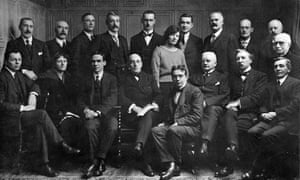It was published weekly on Saturdays until 1836, when a Wednesday edition was added. In 1855 the abolition of Stamp Duty on newspapers finally made it possible to publish the paper daily, at a reduced cover price of 2d.
The Guardian achieved national and international recognition under the editorship of CP Scott, who held the post for 57 years from 1872. Scott bought the paper in 1907 following the death of Taylor’s son, and pledged that the principles laid down in the founder’s will would be upheld by retaining the independence of the newspaper. CP Scott outlined those principles in a much-quoted article written to celebrate the centenary of the paper: “Comment is free, but facts are sacred… The voice of opponents no less than that of friends has a right to be heard.”
After retiring from an active role in managing and editing the paper, Scott passed control to his two sons, John Russell Scott as manager and Edward Taylor Scott as editor. Realising that the future independence of the paper would be jeopardised in the event of the death of one or the other, the two sons made an agreement that in the event of either’s death, one would buy the other’s share.
CP Scott died in 1932 and was followed only four months later by Edward, so sole ownership fell to JR Scott. Faced with the potential of crippling death duties and the predatory interest of competitors, Scott contemplated a radical move to ensure the future of both the Guardian and the highly profitable Manchester Evening News. He concluded that the only solution was to give away his inheritance, a far-reaching solution which provoked close advisor (and future Lord Chancellor) Gavin Simonds to conclude: “you are trying to do something which is very repugnant to the law of England. You are trying to divest yourself of a property right”.

In June 1936, JR Scott formally passed ownership of the paper to the trustees of the Scott Trust. As well as pledging to ensure the radical editorial tradition of the paper (that the newspaper “shall be conducted in the future on the same lines and in the same spirit as heretofore”, in the words of the founder’s legacy), the Scott Trust also has the duty to maintain a secure financial footing for the business: “…to devote the whole of the surplus profits of the Company which would otherwise have been available for dividends…towards building up the reserves of the Company and increasing the circulation of and expanding and improving the newspapers.” These principles remain the only instructions given to an incoming editor of the Guardian, though the Scott family retained an interest in the running of the company until 1984, when, aged 70, Richard F Scott retired from the chairmanship of the Trust.
News is under threat …
… just when we need it the most. The Guardian’s honest, authoritative, fact-based reporting has never mattered more. As we face the biggest challenge of our lifetimes, we’ll remain with you, so we can all better understand and combat the crisis. But at this crucial moment, news organisations are facing an existential threat. With advertising revenues plummeting, we risk losing a major source of our funding. More than ever before, we need your support to help fill the gap.
We believe everyone deserves to read quality news and measured explanation, in times of crisis and beyond. That’s why we keep our journalism free from a paywall and open to everyone – something enabled only by reader support. You’re now visiting in your millions, and supporting us from 180 countries around the world.
We have upheld our editorial independence in the face of the disintegration of traditional media. Free from commercial ownership and political bias, our journalism is never influenced by billionaire owners or shareholders. Our agenda and opinions are our own, and this makes us different. It means we can challenge the powerful without fear – investigating, disentangling and interrogating.
We need your support so we can keep delivering open, independent journalism. Every contribution, however big or small, helps secure our long term future. Support the Guardian from as little as $1 – and it only takes a minute. Thank you.
